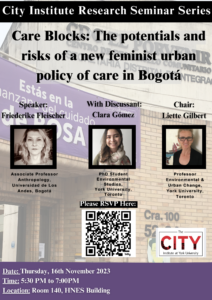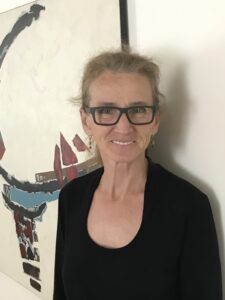Care Blocks: The potentials and risks of a new feminist urban policy of care in Bogotá

In the early months of 2019, confronted with a yet unknown rapidly spreading infectious disease, the world went into panic mode. Offices sent employees to work from home, schools and other social institutions were closed, and people were increasingly isolated in their homes. Care work became the center of households’ daily concerns, and especially women spent even more time and unpaid labor on related tasks. This was the moment when the Bogotá Mayor’s Office introduced a new policy in the city’s neglected and impoverished urban peripheries that aims at fostering class and gender equality. In this talk, we present the initial findings of our research project about the innovative program “Mananzas de Cuidado” (Neighborhood Care Centers), which offers a variety of services to “carers” in an effort of alleviate their burden and improving women’s lives. We begin by describing the policy and services in detail, and focus on what has made this politics work. Besides political willingness, we argue that it is especially the care block coordinators’ personal dedication that pushes this project forward. De-bureaucratizing official procedures, reducing clients’ waiting times, and building trust with disadvantaged populations, these women are bridges between civil society and the state. At the same time, their limited labor contracts and strenuous daily shifts put them at high risk for burnout and job desertion, and with that endanger the care centers’ future itself.
Speaker: Friederike Fleischer,
Associate Professor of Anthropology, Universidad de Los Andes, Bogotá.
Friederike Fleischer is an Associate Professor of Anthropology at Universidad de los Andes. Previously, she was a post-doctoral fellow at the Max Planck Institute for Social Anthropology (2006-2009). Friederike’s work in urban anthropology in China and Colombia focuses on inequality, housing, mobility, and care. She has published the monographs Suburban Beijing (Minnesota University Press, 2010) and Soup, Love, and a Helping Hand: Social Support in Guangzhou, China (Berghahn, 2018), and co-edited Ethnographies of Support (Palgrave 2013).
Recent publications include “’Like Sardines in a Can’. Gender Stratification, and Mobility in the Lives of Female Household Employees in Bogotá, Colombia,” in Urban Mobility and Social Equity in Latin America…. D. Oviedo, N. Villamizar, A. M. Ardila eds. Emerald Publishing, 2020; “The Normalization of Bogotá Social Housing Residents. Class Tensions in Third World Urban Peripheries,” City & Society, 32:3; “Contentious Memories: History and Urban Redevelopment in Bogotá, Colombia,” Journal of Urban Affairs, September 2020.
Friederike recently finished research on domestic workers’ mobility in Bogotá and is currently involved in the research projects “Vertical Peripheries: Planning and citizenship in Colombia's commodified periurban housing towers,” with Luisa Sotomayor, Lina Brand Correa (both at York University, Toronto) and Adriana Hurtado (Universidad de los Andes) and financed by the SSHRC; and “Bogota’s Care Blocks” (with Maria Jose Alvarez and Adriana Hurtado, Universidad de los Andes). In July 2023, together with researchers from LSE, ICESI, Despegar, and UCLG, Friederike began a three-year research project about Technology, Local Government, and Youth Participation in Intermediary cities in Colombia funded by the Botnar Foundation.
Discussant: Clara Gómez,
PhD Student in Environmental Studies
Clara Gómez is a first-year Ph.D. student in the Environmental Studies program in the Faculty of Environmental and Urban Change at York University. With a background in urban management, development, and international cooperation, Clara graduated Cum Laude from the Master's in Interdisciplinary Development Studies at Universidad de Los Andes in Bogota. Clara is currently the research coordinator of City Institute’s SSHRC-funded project “Vertical Peripheries: Planning and Citizenship in Colombia’s Periurban Housing Towers” and has several years of experience in social research and consulting.
Clara’s research interests encompass housing access, residential trajectories, urban informality, feminist urbanism, care work, and institutional analysis. Her current research project focuses on how the production of social housing in Bogotá influences the care work carried out by residents and how care tasks shape changes to the dwellings and the residential trajectories of women.
Chair: Liette Gilbert,
Faculty of Environmental & Urban Change

Liette Gilbert is a Professor in the Faculty of Environmental & Urban Change at York University. Professor Gilbert's research examines the oppositional struggles and alternative narratives or claims voiced by marginalized people as a form of resistance and expressions of citizenships. She has written on the politics of sub/urban re/development (from Lac-Mégantic to Mexico City). She has also published extensively on issues of neoliberalisation of immigration policy, securitization and criminalization of immigration, social justice, media representations of immigration and multiculturalism, and North American border politics. She is the co-author of The Oak Ridges Moraine Battles: Development, Sprawl and Nature Conservation in the Toronto Region with her colleagues L. Anders Sandberg and Gerda R. Wekerle. The book examines local and regional environmental politics from a critical political ecology perspective. With her colleague Luisa Sotomayor, she is currently researching how 'non-status citizenship' is negotiated in municipal governance and planning politics in Toronto (and Montreal). Her theoretical and methodological approaches consider the various incongruities between ideologies, policies and everyday practices.

